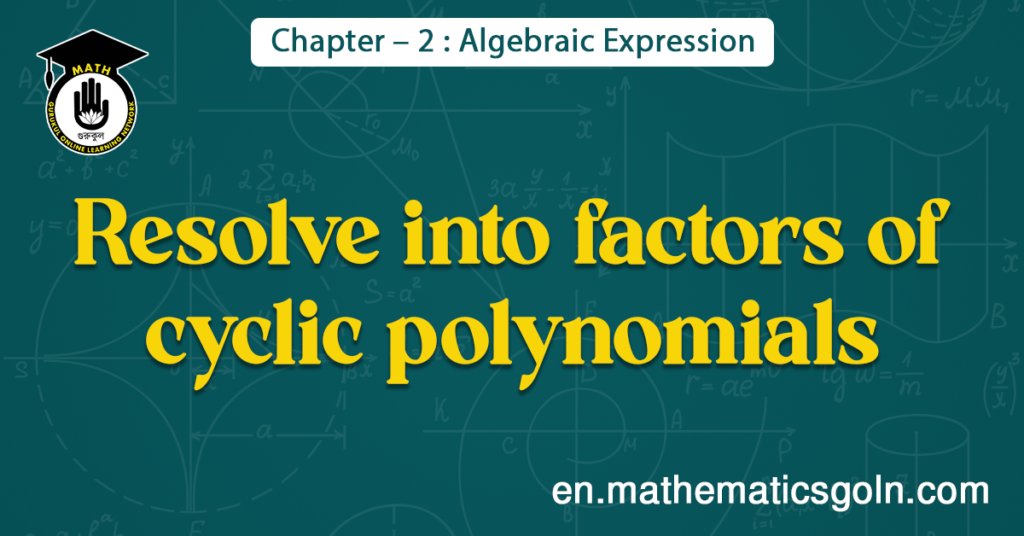Today is our topic of discussion Resolve into factors of cyclic polynomials .
Resolve into factors of cyclic polynomials
There is no hard and fast rule for factorizing polynomials. Often a factor can be found by suitable rearranging the terms. Sometimes assuming the expression as polynomial of the variable, we determine one or more than one factors by the factor theorem and considering the cyclic and symmetric properties of the expression, we determine the remaining factors.
In this regard, it may be noted that, of the variable, a, b, c
1) If (a – b) be the factor of a cyclic polynomial then, (bc) and (c-a) will be the factor of that polynomial.
2) k(a+b+c) and k(a²+b²+c²)+m(ab+be+ca) are the homogeneous and cyclic polynomial of degree 1 and 2 where k and m are constant.
3) If the values of two polynomials are equal for all values of the variables, the coefficient of the corresponding two terms of the polynomial will be equal.
An Important Algebraic Formula:
For all values of a, b, c,
a³ + b³ + c³ − 3abc = (a+b+c)(a² + b² + c² — ab – bc — ca)
Proof:
Two proofs of the formula are given below.
First method (Direct applying algebraic method)
Second method (using properties of homogeneous cyclic expressions) Considering the expression a³+b3+c³-3abc a polynomial P(a) of variable a and putting in it, a = -(b+c) we get,
P{−(b+c)} = −(b+c)³ + b³ + c³ + 3(b + c)bc = (b + c)³ − (b + c)³ = 0
Therefore, a+b+c is a factor of the expression under consideration. As a3+b3c3-3abc is a homogeneous cyclic polynomial of degree 3, the other factor will have the form k(a² + b² + c²)+m(ab+be+ca) where k and m constant. Therefore, for all values of a, b and c
a³+b³c³-3abc = (a+b+c){k(a² + b² + c²)+m(ab+be+ca)}
Here first putting a = 1, b = 0, c = 0 and then a = 1, b = 1, c=0 we get, k = 1 and 2 = 2(k × 2+ m) i.e., k = 1 and 1=2+m ⇒ m = −1 .. a³ +63 + c³-3abc = (a+b+c) (a² + b² + c² – ab – bc – ca)
Corollary 1. a³ +b³ + c³ – 3abc = } (a+b+c) { (a − b)² + (b − c)² + (c − a)²}
Proof:
a2+b² + c²-ab-bc- ca
= (2a² +262 +2c² – 2ab – 2bc-2ca)
= {{(a² − 2ab+b²) + (b² − 2bc + c²) + (c² — 2ca + a²)}
= {(a – b)² + (b −c)² + (c− a)²} .. a³+63 + c³-3abc = (a+b+c){(a – b)² + (b −c)² + (c-a)2}
Corollary 2. if a+b+c=0, then a³ +63 + c³ = 3abc
Corollary 3. if a³ +63 + c³ = 3abc, so a+b+c=0 or a = b = c
See more:

